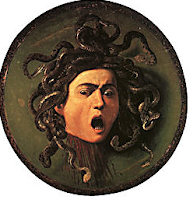 In ‘Medusa’, Carol Ann Duffy creates a personification of jealousy that flickers from mythical re-imagining, through metaphor to a vividly specific instance of ‘Love gone bad.’ The language of the first person narrator is violent, mixing classical idea with base colloquialism (‘shit’) and onomatopoeia like machine gun fire. The use of the imperative is sublime: ‘Be terrified. // It’s you I love.’
In ‘Medusa’, Carol Ann Duffy creates a personification of jealousy that flickers from mythical re-imagining, through metaphor to a vividly specific instance of ‘Love gone bad.’ The language of the first person narrator is violent, mixing classical idea with base colloquialism (‘shit’) and onomatopoeia like machine gun fire. The use of the imperative is sublime: ‘Be terrified. // It’s you I love.’The structure is regular: six lines per stanza, each one perfectly end-stopped, but the line length is as jagged as the mood. The rhymes, when they come, are out of step, as in stanza three where ‘own’ rhymes with ‘stone’ and in four where ‘ground’ only half-rhymes with ‘down’ – echoing the colloquialism ‘ground down’. The regular/irregular structures create a violent stop/start feel, as if the narrator is spitting out her thoughts. The lists of rhetorical questions at the end of the poem add to the rapid-fire effect – of questions that need no answer: it’s contained in the past tense. She ‘was’ beautiful, ‘was’ fragrant, ‘was’ young. Not any more.
Like many of Duffy’s other poems, this dramatic monologue is a re-imagining of a fictional or historical character (as in ‘Havisham’, ‘Elvis’ Twin Sister’, ‘Ann Hathaway’ among others). ‘Medusa’ becomes modern, and the transformation into monster becomes a metaphor for the power of jealousy to corrupt. The key theme is hammered home in the rule of three on the first line: ‘a suspicion, a doubt, a jealousy’. Each idea is expressed with the indefinite ‘a’ – but the cumulative effect is a definite, physical change: ‘hairs’ to ‘filthy snakes’ – which is literal. She says later it was ‘as though’ her thoughts ‘hissed and spat on her scalp.’ She is disturbingly self-aware of what she has become.
In the next stanza she lists her monstrous qualities, with language of change in the shifting verb tense: ‘breath soured‘, ‘I’m now’, ‘there are bullet tears’. The antithesis of murderous missile (‘bullet’) with ‘tears’, often viewed as soft and feminine explores the contradictory nature of jealousy: it hurts, and can make you dangerous. This is developed in the imperative ‘Be terrified’. She commands not just fear but terror, and the next line: ‘It’s you I love’ is not quite a casual connection. Jealousy is the cutting edge of love.
The relationship of Medusa to her lover is given more space in the third stanza. In the first two, she narrates the transformation, describing herself. At the end of the second, we see this is second person with the word ‘you’. She’s talking to – or accusing – someone. The love object is idealised ‘perfect’, with the literal/metaphorical flux of ‘Greek god’ (metaphor for perfect man, here also a reference to the literal man in the Greek myth). She controls him in clipped language, tightened by the internal rhyme of ‘betray’ and ‘stay’. When she says ‘I know you’ll go, betray me, stray’ – it’s as if she’s telling the future. His infidelity then, may not have happened yet – may never happen – which suggests this jealousy is only an idea – albeit one that to her, has become so real it has altered her physically.
The idea of the power of imagination to effect real transformation is explored in the next two stanzas. As the narrator looks at a series of creatures, from small to large, she transforms each to stone, in violent onomatopoeia, ‘pebble’, ‘gravel spattered’, ‘housebrick shattered’, then ‘boulder rolled in a heap of shit’. This feels like more than metaphor. The earthy, concrete imagery of everyday objects creates a realistic feel. Yet in the next stanza, we could believe it is metaphor again. When she ‘stared in the mirror’, ‘Love gone bad // showed me a gorgon’. The fact it is ‘showed’ to her, suggests it is perhaps not there, and the mythical ‘dragon’ continues the shift to the metaphorical away from the real. Duffy never lets the monster image sit perfectly in reality or dream: it shimmers between both. Her lover comes with ‘a shield for a heart’ and a ‘sword for a tongue’ like Perseus coming to kill the monster, made more poignant as the ‘greek god’ in the poem was once her lover. The weapons here are clearly metaphorical. This time, his infidelity feels real, in the plaintive refrain, ‘your girls, your girls’. His affair now is not only in her head, perhaps. The final line sits proud of any stanza, as if stolen from the first stanza, which is one line too short, broken off, perhaps. It is about transformation, shown again in the word ‘now’, but it is also a command: ‘look at me now’. Presumably if he does, he’ll be turned to stone: she commands him to look at the ugliness that has corrupted her, the jealousy, her fears.
